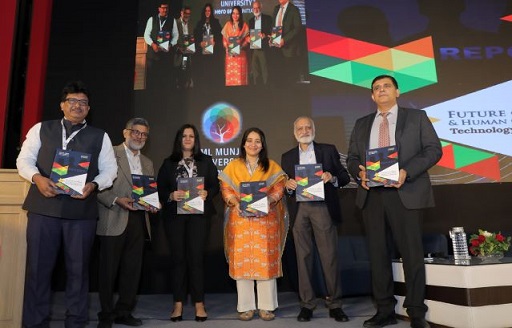
A report titled, ‘Future Of Work & Human Challenges: Technology & Beyond (FOW)’ based on a survey commissioned by Gurgaon-based BML Munjal University (BMU) and released on Nov 19, 2022 says that the existing skills gap especially with soft skills and the role of higher education institutions remains critical to prepare a future, more employable workforce. In an interesting finding on the issue of moonlighting, a majority of HR respondents are okay with the trend. While 43% were not in favor and called it cheating, 49% say they would be okay with it as long as the employee declares it.
The study based on response of 250 HR Leaders and interviews of 20+ academic and industry leaders concludes that despite the global outlook, HR Leaders are confident about the prospects of business growth of their organizations over the next 1 to 3 years with 89% saying their organizations should experience strong growth but market instability (36%), inflation (21%), and future Covid-19 variants (23%) are the most likely to play truant to this. Only 13% cite talent or skills shortage to be a challenge to growth.
43% of HR leaders state that reskilling employees is therefore their top most priority followed by hiring talent at 26.6%. Nearly 18% say that helping employees navigate workplace challenges is a conscious strategy to help retain talent especially in a post Covid-19 workplace that is defined by change and uncertainty.
HR Leaders who responded to the survey represent a mix of industries and included IT/ITeS, Consulting, Banking and Financial services, manufacturing, automobile, retail, oil and gas, and renewable energy among others. 59% were women HR Leaders while men HR Leaders constituted the other 41%. 49% of the respondents say IT / mobile / data analytics / R&D are the business areas that need to address potential skill gaps the most, followed by executive management and sales & marketing at around 12% each.
A new work order is giving way to the importance of soft-skills. 38% say that the importance of soft skills cannot be overemphasized as it allows talent to adapt quickly to a changing economy and needs. 31% state that a lack of soft skills among candidates can limit the company’s productivity.
A new work order is also evident in how organizations are choosing to reward and motivate employees. HR Leaders say that both effort and achievement are celebrated equally to motivate employees and not just the latter. Further, 25% also say that failures are celebrated that furthers the importance of putting in the optimum effort. Teamwork 57%, followed by creativity 54%, and communication 50%, emerge as the top three soft skills that are most in demand. Freshers (38%) form the largest cohort of talent that HR Leaders are looking to recruit to address the skill gap in their organizations followed by those in middle and senior management at 30% each.
Higher education institutions can play a fundamental role in preparing talent for employability. An overwhelming 84% of respondents say that higher education institutions must change the way they groom students to make them ‘more’ employable by imparting soft skills training. 43% emphasize on a focus on soft skills such as communication, creativity, resilience, empathy, and integrity, 21% say hands-on education to prepare students for the ‘real world’ and 18% say that there must be a stress on helping develop a learners mind set and curiosity as opposed to knowledge acquisitions. Students would do well to develop a tolerance for uncertainty and a penchant for initiative, advising 30% of HR Leaders to be able to maneuver the new emerging world of work.
The report was released at the third edition of the Leadership Summit at the university campus with Kiran Karnik, Chairman, IIIT Delhi & Former President, NASSCOM as the keynote speaker. At the summit, BMU hosted three-panel discussions around a) future of work and technology b) future of work beyond technology and c) future of work and human challenges with C-suite speakers from Capgemini India, Adani Group, NASSCOM, Microsoft, Datamatics India, Google Cloud, and many more. The discussions examined the intersections between technology and control in a variety of work contexts, using both quantitative and qualitative lenses and also focused on the fundamental human challenges that lie ahead with the future of work that go beyond technology.
Dr. Kiran Karnik, while speaking at the Summit said “There could be various alternative scenarios of the future, as related to technology and jobs. One could well argue that the future is not about jobs, but about livelihoods; that the current concerns about “quality” jobs which assure social security benefits is ill-founded. Instead, we need to look at livelihoods, with part-time, fixed-period and gig work being predominant – supported, of course, by a universal system of retirement, pension and social security guarantees. Also, there is no cause to look at Artificial Intelligence (AI) or robots as threats: the future will not be a man or machine dichotomy, but a man plus machine model.”
Prof Shyam Menon, Vice Chancellor, BMU said, “The report has highlighted how FutureTech, Growth Mindset, Quality of Life, Corporate Citizenship, Strong Industry-Academia Partnership along with Meta Skills, SDGs and scientific practices from Indian Knowledge Systems are going to inform and shape the future of work in India. I won’t be surprised if this report sets a trend in the country and pioneers research and practice initiatives in academia and industry respectively to deep dive into predictive analysis in the field of future of work.”








